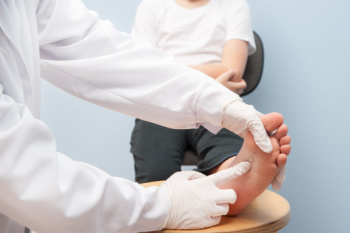
Plantar warts are growths on the bottom of the foot that make walking uncomfortable. Children are more likely to develop plantar warts than adults, because adults develop more resistance to the virus over time. Care from a chiropodist is important in managing this infection, because it can alter the continued development of your child’s foot and how they walk. Plantar warts, caused by the human papillomavirus, or HPV, are thickened skin on the bottom of the foot, with tiny black dots or white lesions. They thrive in warm, moist environments like locker room floors and swimming pool areas. Direct contact is all it takes, particularly if there is a break in the skin. Treatments for plantar warts vary, from salicylic acid applications to cryotherapy sessions. Salicylic acid, available in various forms, can gradually burn off the wart, while cryotherapy freezes it away. For stubborn plantar warts, a combination of treatments might be necessary, especially if they have returned after previous attempts. If a plantar wart is spreading or causing pain, it is suggested that you schedule an appointment with a chiropodist who can examine it and recommend the most effective treatment plan.
Plantar warts can be uncomfortable or even painful. If you’re suffering from warts on your feet, please consult with one of the chiropodists from Complete Family Footcare & Therapy. Our clinicians can help you maintain the health of your lower limbs and your mobility.
What Does a Plantar Wart Look Like?
Plantar warts are fleshy growths that generally have a rough, grainy texture. They may look and feel like a callus and are usually small and can grow individually or in clusters. Plantar warts may have small, black dots at their center that are actually tiny blood vessels. Warts interrupt the natural lines of your skin.
Treatment Options
Salicylic acid - A chemical solution applied directly to the wart
Cryotherapy - Freezing the wart off with liquid nitrogen
Minor surgery - Removing the wart through excision
Laser treatment - A concentrated beam of light is used to remove the wart
Wearing comfortable shoes and socks to avoid irritating the wart
Over-the-counter medications for pain relief
Patches to keep pressure off the warts
Plantar warts can go away on their own, but this may take several months to years. If your plantar warts are bothering you, seeking medical treatment is suggested. If you have any questions, please feel free to contact our offices located in . We offer the newest diagnostic and treatment technologies for all your foot care needs.
